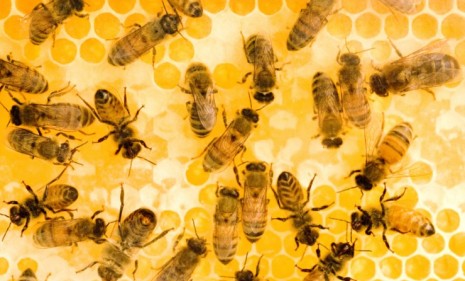Can 'super-bees' solve the world's food crisis?
The honeybees who pollinate our crops are disappearing, but researchers are trying to breed survivor insects to carry on

A free daily email with the biggest news stories of the day – and the best features from TheWeek.com
You are now subscribed
Your newsletter sign-up was successful
Honeybees are dying off, and scientists aren't entirely sure why. Since we depend on the bees to pollinate our crops, their disappearance could be catastrophic, exacerbating a worsening food crisis. Researchers at Canada's University of Manitoba are trying to help by creating super-bees that can survive conditions normal bees can't. Here, a brief guide:
Bees are dying off?
Big time. A baffling phenomenon known as "Colony Collapse Disorder" began decimating honeybee populations in 2006. Mites and viruses have contributed to the die-off, but scientists cite plenty of other culprits, including pesticides, climate change, and even cell phone use.
The Week
Escape your echo chamber. Get the facts behind the news, plus analysis from multiple perspectives.

Sign up for The Week's Free Newsletters
From our morning news briefing to a weekly Good News Newsletter, get the best of The Week delivered directly to your inbox.
From our morning news briefing to a weekly Good News Newsletter, get the best of The Week delivered directly to your inbox.
How many dead bees are we talking about?
Scientists have tallied the disappearance of 85 percent of all bees in the Middle East, up to 30 percent of those in Europe, and more than 30 percent of American bees.
So how exactly does one create a super-bee?
First, the researchers are collecting queen bees from hives that have proven exceptionally resistant to mites. The queens taken from these hives are then placed in new hives, exposing them to even more "disease pressure." The theory is that each generation of survivors will be hardier than the last.
A free daily email with the biggest news stories of the day – and the best features from TheWeek.com
Does this really work?
It is certainly an effective way to separate strong bees from the weak ones. The mite-resistant super-bees are also less susceptible to other threats, such as cold. Only 46 percent of normal European honeybees typically survive through winter, but the supercharged bees have a 75 percent survival rate.
Why is it this so important?
Of the 100 crops that provide nearly all of the world's food, bees pollinate 70. That amounts to $83 billion worth of fruits and vegetables a year. High fuel costs and other factors have already driven up food prices enough to provoke riots in 2008. The prospect of a drop in the food supply due to the bee die-off could make matters far, far worse.
So will super-bees save us from disastrous food shortages?
"Mite-resistant bees are probably not the panacea to our bee crisis," says Ariel Schwartz at Fast Company. But "at the very least," Schwartz says, "breeding better bees may give us time to figure out more of the reasons that the pollinators are disappearing — before it's too late."
Sources: Christian Science Monitor, DVICE, Digital Trends, Fast Company, io9
-
 The world’s most romantic hotels
The world’s most romantic hotelsThe Week Recommends Treetop hideaways, secluded villas and a woodland cabin – perfect settings for Valentine’s Day
-
 Democrats push for ICE accountability
Democrats push for ICE accountabilityFeature U.S. citizens shot and violently detained by immigration agents testify at Capitol Hill hearing
-
 The price of sporting glory
The price of sporting gloryFeature The Milan-Cortina Winter Olympics kicked off this week. Will Italy regret playing host?